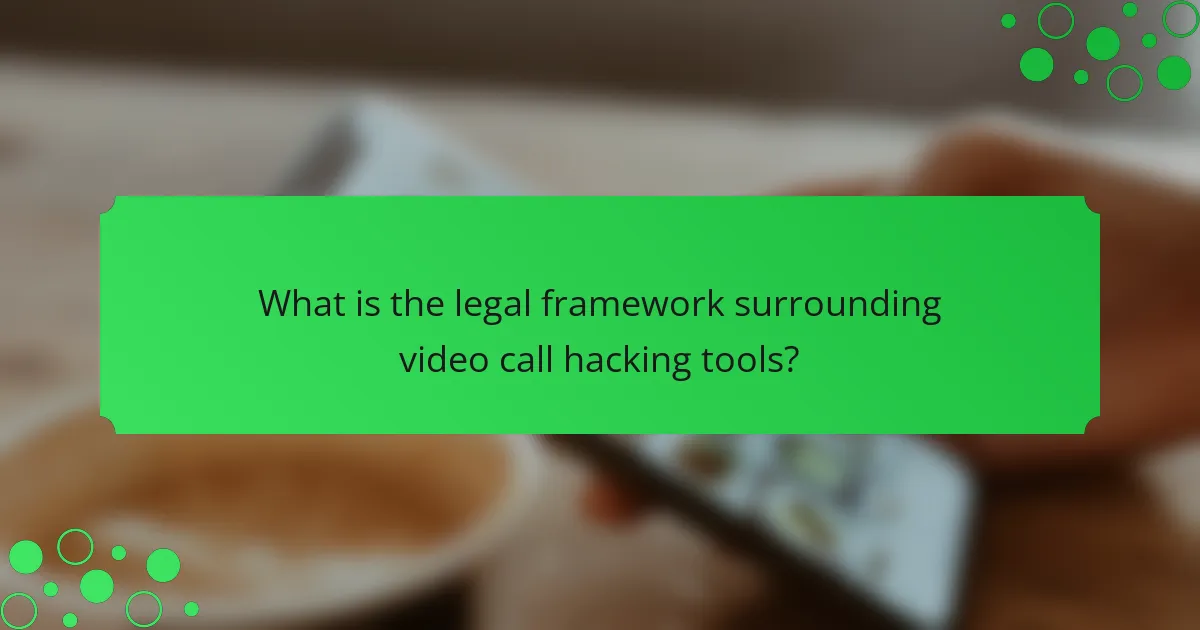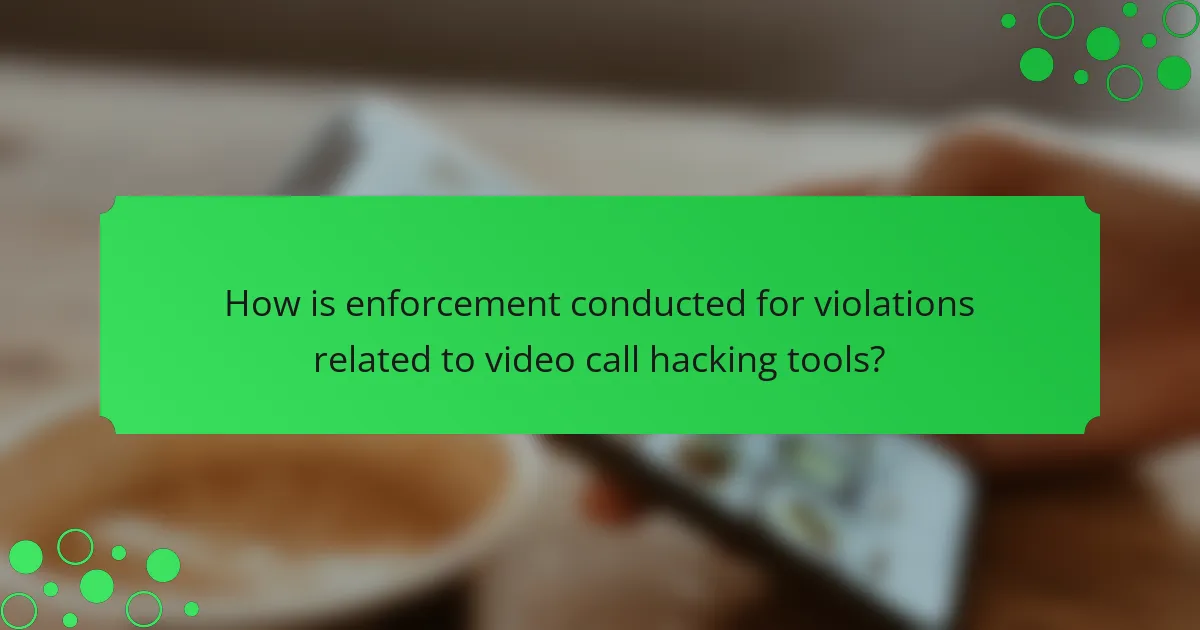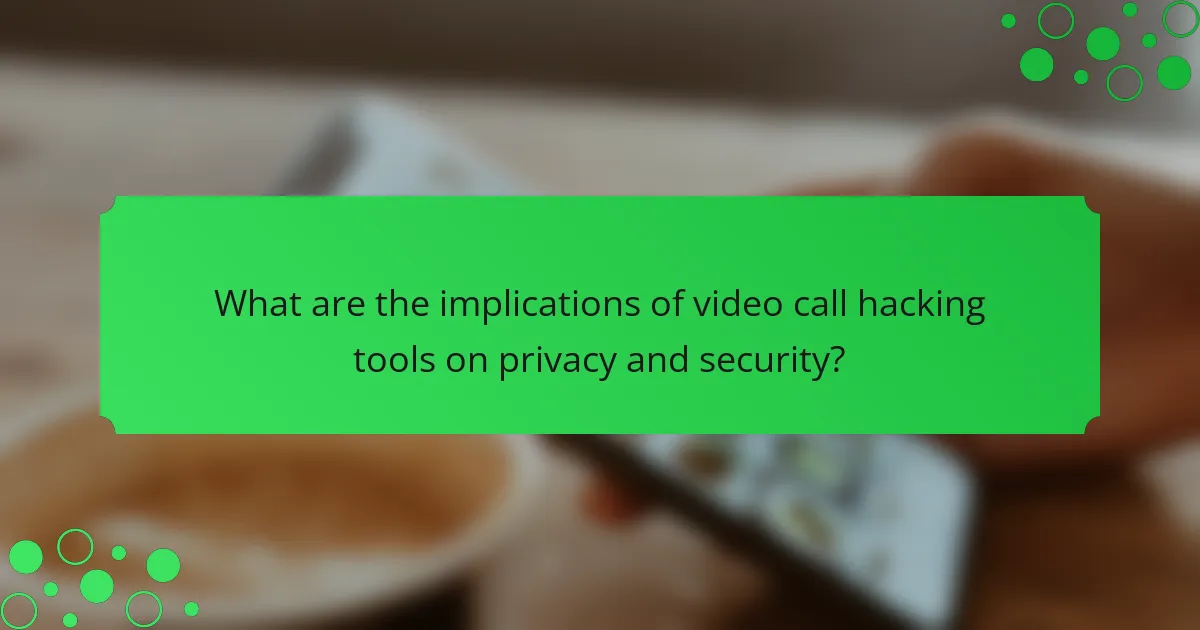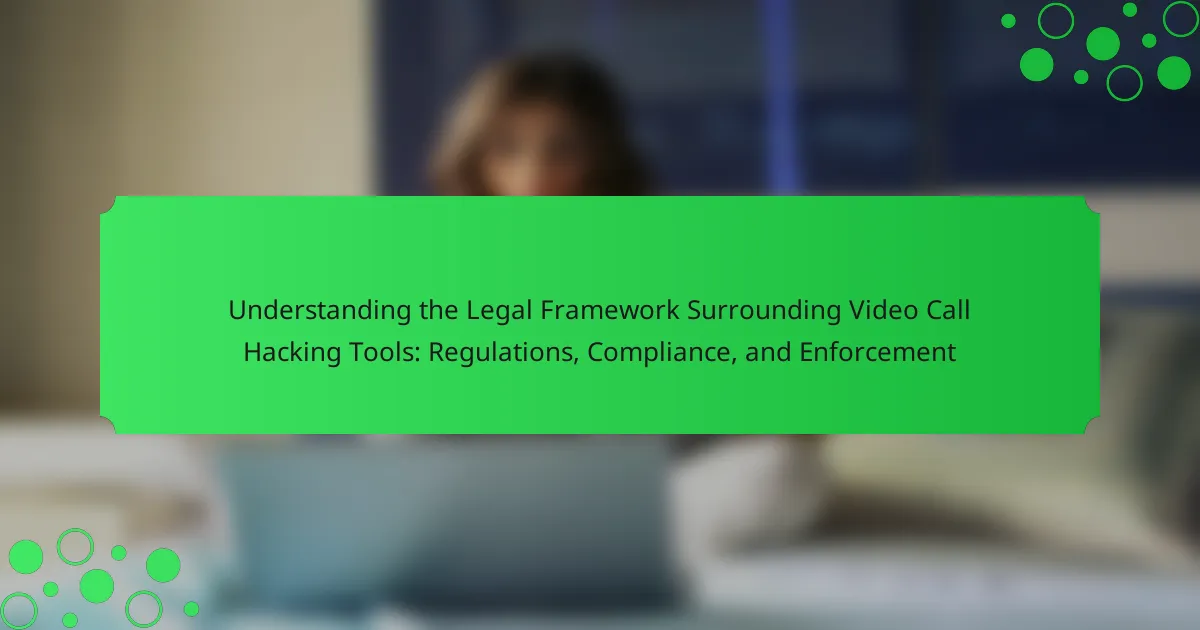The legal framework surrounding video call hacking tools encompasses various laws and regulations aimed at preventing unauthorized access to computer systems and protecting individual privacy during digital communications. Key legislation, such as the Computer Fraud and Abuse Act in the United States and the General Data Protection Regulation in the European Union, outlines the legal consequences for hacking activities, including significant fines and imprisonment. Courts have upheld these laws in numerous cases, emphasizing the importance of compliance and the enforcement mechanisms in place to address violations. Additionally, the article highlights the risks posed by video call hacking tools, including data breaches and identity theft, and underscores the necessity for robust security measures to safeguard against these threats.

What is the legal framework surrounding video call hacking tools?
The legal framework surrounding video call hacking tools is defined by various laws and regulations that address unauthorized access to computer systems. In many jurisdictions, laws such as the Computer Fraud and Abuse Act in the United States criminalize hacking activities. These laws prohibit accessing a computer or network without permission, which includes hacking into video call platforms.
Additionally, privacy laws, such as the General Data Protection Regulation in the European Union, protect individuals’ data during video calls. Violating these laws can lead to significant penalties, including fines and imprisonment. The legal landscape also includes regulations related to wiretapping and electronic communications, which may apply to the interception of video calls.
Courts have upheld these laws in various cases, reinforcing the legal consequences of using hacking tools. For instance, in cases involving unauthorized access to video conferencing applications, individuals have faced prosecution under existing cybercrime laws.
How do video call hacking tools operate within this legal framework?
Video call hacking tools operate within a legal framework by exploiting vulnerabilities in software and networks. These tools often bypass security measures to gain unauthorized access to video calls. Legal frameworks vary by jurisdiction, impacting the prosecution of such activities. In many regions, laws prohibit unauthorized access to computer systems, including video conferencing platforms. Violators can face criminal charges, fines, or civil lawsuits. Additionally, the use of these tools can breach privacy laws, as they may capture sensitive information. Enforcement agencies monitor and investigate incidents involving these tools to uphold legal standards.
What are the key legal definitions related to video call hacking tools?
Video call hacking tools are defined as software or methods used to gain unauthorized access to video conferencing platforms. These tools can facilitate eavesdropping, data theft, or disruption of communication. Legally, such actions may fall under statutes related to computer fraud and abuse. For instance, the Computer Fraud and Abuse Act (CFAA) in the United States criminalizes unauthorized access to computers and networks. Additionally, laws regarding wiretapping and privacy violations can apply to the interception of video calls. Jurisdictions may vary, but many enforce strict penalties for the misuse of these tools.
How do jurisdictions vary in their definitions of video call hacking?
Jurisdictions vary in their definitions of video call hacking based on local laws and regulations. Some jurisdictions classify video call hacking as unauthorized access to communication platforms. Others may define it as any form of interception or manipulation of video calls. For instance, the United States may consider it a violation of the Computer Fraud and Abuse Act. In contrast, European countries often refer to the General Data Protection Regulation for privacy breaches. Definitions can also depend on the intent behind the act, such as malicious intent versus benign curiosity. Furthermore, specific laws may address the use of hacking tools in different ways. These variations reflect the broader legal frameworks and cultural attitudes towards privacy and cybersecurity.
What are the primary regulations governing video call hacking tools?
Video call hacking tools are primarily regulated under laws addressing cybersecurity and privacy. Key regulations include the Computer Fraud and Abuse Act (CFAA) in the United States, which prohibits unauthorized access to computer systems. The General Data Protection Regulation (GDPR) in Europe also governs the use of personal data during video calls. Additionally, various state laws, such as California’s Privacy Rights Act, impose specific requirements for data protection. These regulations aim to protect individuals from unauthorized surveillance and data breaches. Violations can lead to severe penalties, including fines and imprisonment.
Which laws specifically address the use of hacking tools for video calls?
The Computer Fraud and Abuse Act (CFAA) addresses the use of hacking tools for video calls. This U.S. law prohibits unauthorized access to computer systems. It includes provisions against the use of tools that facilitate such access. The Electronic Communications Privacy Act (ECPA) also applies, protecting communications from interception. This law makes it illegal to access video calls without consent. Additionally, various state laws may impose further restrictions on hacking tools. These laws collectively create a legal framework against unauthorized video call access.
How do these regulations impact developers and users of hacking tools?
Regulations significantly impact developers and users of hacking tools by imposing legal restrictions and compliance requirements. Developers face potential criminal charges if they create or distribute hacking tools that violate laws. This can lead to fines or imprisonment, as seen in cases where individuals were prosecuted under the Computer Fraud and Abuse Act. Users of hacking tools may also face legal consequences, including civil lawsuits and criminal charges for unauthorized access to systems. Moreover, regulations can limit the availability of hacking tools, making it harder for users to obtain them legally. These impacts create a deterrent effect, discouraging both development and usage of such tools in illegal contexts.
What compliance requirements exist for organizations using video call technologies?
Organizations using video call technologies must comply with various regulations. Key compliance requirements include adherence to the General Data Protection Regulation (GDPR) in Europe. GDPR mandates protection of personal data during video calls. Organizations must ensure data encryption and secure storage of recorded sessions.
Additionally, the Health Insurance Portability and Accountability Act (HIPAA) applies to healthcare-related video calls in the U.S. HIPAA requires safeguarding patient information during virtual consultations. Organizations must implement measures to ensure confidentiality and integrity of health data.
Furthermore, compliance with the Federal Information Security Management Act (FISMA) is necessary for U.S. federal agencies using video calls. FISMA outlines security requirements for federal information systems. Organizations must conduct regular security assessments and audits.
Lastly, organizations should also consider industry-specific regulations. For example, financial institutions must comply with the Gramm-Leach-Bliley Act (GLBA). GLBA requires financial organizations to protect consumers’ personal information during video communications.
What steps must organizations take to ensure compliance with regulations?
Organizations must implement a compliance program to ensure adherence to regulations. This program should include a thorough assessment of applicable laws. Organizations need to identify specific regulations related to video call hacking tools. They should establish internal policies and procedures that align with these regulations. Training employees on compliance requirements is essential. Regular audits should be conducted to evaluate adherence to policies. Organizations must maintain documentation to demonstrate compliance efforts. Engaging legal counsel for guidance can further enhance compliance strategies.
How can organizations assess their compliance with existing laws?
Organizations can assess their compliance with existing laws by conducting regular audits. These audits help identify areas of non-compliance with legal requirements. Organizations should review relevant laws and regulations applicable to their operations. This includes data protection laws, cybersecurity regulations, and industry-specific guidelines.
Engaging legal experts can provide insights into compliance obligations. Training employees on legal requirements is also essential. Organizations can implement compliance management systems to monitor adherence. Regularly updating policies and procedures ensures alignment with any legal changes.
Documenting compliance efforts is crucial for accountability. A study by PwC indicates that 75% of organizations face challenges in compliance assessments. This highlights the importance of systematic evaluation and proactive measures.

How is enforcement conducted for violations related to video call hacking tools?
Enforcement for violations related to video call hacking tools is conducted through legal mechanisms and regulatory bodies. Authorities monitor and investigate incidents of unauthorized access to video calls. Law enforcement agencies may collaborate with cybersecurity experts to trace the source of hacking tools. Violators can face criminal charges or civil penalties depending on the severity of the offense. Relevant laws, such as the Computer Fraud and Abuse Act in the United States, provide a framework for prosecution. Additionally, organizations may implement internal policies to deter hacking and report incidents to the appropriate authorities. Data breaches involving video calls can lead to significant fines and reputational damage for offenders.
What agencies are responsible for enforcing laws against video call hacking?
The Federal Bureau of Investigation (FBI) is primarily responsible for enforcing laws against video call hacking in the United States. The FBI investigates cybercrimes, including unauthorized access to video communication platforms. Additionally, the Department of Justice (DOJ) plays a crucial role in prosecuting offenders under relevant laws. State law enforcement agencies also enforce local regulations related to cybercrimes, including video call hacking. Cybersecurity divisions within these agencies focus on preventing and addressing such incidents. Their combined efforts aim to protect individuals and organizations from cyber threats.
How do these agencies investigate potential violations?
Agencies investigate potential violations by conducting thorough inquiries and gathering evidence. They utilize various methods such as surveillance, interviews, and data analysis. Agencies may also review records and communications related to the suspected violations. Collaboration with other law enforcement bodies can enhance the investigation process. Forensic analysis of digital evidence is often employed to uncover illicit activities. Agencies may issue subpoenas to obtain necessary information from individuals or organizations. Additionally, tip-offs from the public can initiate investigations. These methods ensure a comprehensive approach to uncovering and addressing violations effectively.
What penalties can organizations face for non-compliance?
Organizations can face significant penalties for non-compliance with regulations surrounding video call hacking tools. These penalties may include hefty fines, which can range from thousands to millions of dollars depending on the severity of the violation. In some cases, organizations may also face legal action, resulting in lawsuits or sanctions. Repeated non-compliance can lead to increased scrutiny from regulatory bodies. Additionally, organizations may experience reputational damage, impacting customer trust and business relationships. Compliance failures can also result in operational restrictions, limiting the organization’s ability to conduct business effectively. Specific examples include fines imposed by the Federal Trade Commission (FTC) for data privacy violations. Such penalties serve as a deterrent to ensure adherence to legal standards.
What role do international laws play in regulating video call hacking tools?
International laws play a crucial role in regulating video call hacking tools by establishing a framework for cybersecurity and privacy protection. These laws address the unauthorized access and interception of communications, which are central to video call hacking. The Budapest Convention on Cybercrime is a significant international treaty that facilitates cooperation among countries to combat cybercrime, including hacking. It encourages nations to adopt legislation that criminalizes unauthorized access to computer systems and data. Additionally, the General Data Protection Regulation (GDPR) in the European Union sets strict rules on data protection and privacy, impacting how video call services must operate to safeguard user information. Compliance with these international laws helps prevent the misuse of hacking tools and promotes accountability among service providers.
How do international treaties affect national regulations on hacking tools?
International treaties influence national regulations on hacking tools by establishing guidelines and standards. These treaties create a framework for cooperation among nations in combating cybercrime. Countries that ratify these treaties often align their laws with international standards. This alignment can lead to stricter regulations on the development and distribution of hacking tools. For example, the Budapest Convention on Cybercrime encourages member states to criminalize the misuse of hacking tools. Compliance with such treaties can enhance a nation’s legal authority in prosecuting cyber offenses. Therefore, international treaties play a crucial role in shaping national legal landscapes regarding hacking tools.
What challenges arise from differing international laws on video call hacking?
Differing international laws on video call hacking create significant challenges for enforcement and prosecution. Jurisdictions may have varying definitions of what constitutes hacking. This can lead to inconsistencies in legal interpretations. Some countries may not recognize video call hacking as a criminal offense. Consequently, perpetrators may exploit these legal gaps to evade justice. Additionally, international cooperation becomes complicated when laws differ. Countries may struggle to extradite offenders or share evidence effectively. The lack of a unified legal framework hinders global efforts to combat cybercrime. These challenges underscore the need for harmonization of laws across nations.

What are the implications of video call hacking tools on privacy and security?
Video call hacking tools significantly compromise privacy and security. These tools can intercept communications, allowing unauthorized access to sensitive information. Hackers can exploit vulnerabilities in software to gain control over video calls. This intrusion can lead to data breaches, identity theft, and unauthorized surveillance. According to a 2021 report by Cybersecurity & Infrastructure Security Agency, over 40% of organizations experienced video conferencing security incidents. Such incidents underline the importance of robust encryption and security protocols. Failure to implement these measures can result in legal repercussions and loss of consumer trust.
How do video call hacking tools pose risks to user privacy?
Video call hacking tools pose significant risks to user privacy by enabling unauthorized access to personal conversations. These tools can exploit vulnerabilities in video conferencing software. Hackers can intercept audio and video feeds, leading to potential data breaches. Sensitive information, including personal and financial details, may be exposed. The use of malware can facilitate these breaches, often without users’ knowledge. According to a 2021 report by Cybersecurity and Infrastructure Security Agency, incidents of video conferencing hacking increased by 400% during the pandemic. This trend highlights the urgent need for robust cybersecurity measures to protect user privacy.
What measures can users take to protect themselves from hacking?
Users can protect themselves from hacking by implementing strong passwords and two-factor authentication. Strong passwords should be complex, combining letters, numbers, and symbols. Two-factor authentication adds an extra layer of security by requiring a second form of verification. Regularly updating software and applications also helps close security vulnerabilities. Users should avoid clicking on suspicious links or downloading unknown attachments. Keeping personal information private reduces the risk of social engineering attacks. Using a reputable antivirus program can detect and prevent malware. Finally, educating oneself about phishing tactics can enhance awareness and prevention.
How can organizations enhance security to mitigate risks?
Organizations can enhance security to mitigate risks by implementing multi-factor authentication (MFA). MFA adds an extra layer of protection beyond just passwords. This approach significantly reduces unauthorized access. According to a study by Microsoft, MFA can block over 99.9% of automated attacks.
Regular security training for employees is also crucial. Educated staff are less likely to fall victim to phishing attacks. The 2021 Verizon Data Breach Investigations Report found that human error is a major factor in data breaches.
Another effective measure is conducting regular security audits. These audits help identify vulnerabilities and ensure compliance with regulations. Organizations should also keep software and systems updated to protect against known vulnerabilities. The National Institute of Standards and Technology (NIST) recommends timely updates as part of a robust cybersecurity strategy.
Lastly, organizations should establish an incident response plan. This plan prepares teams to respond quickly to security breaches. A well-defined response can minimize damage and recovery time.
What best practices should organizations follow to remain compliant?
Organizations should implement a comprehensive compliance program to remain compliant. This program should include regular audits to assess adherence to regulations. Organizations must also train employees on legal obligations and ethical standards. Documenting policies and procedures is essential for transparency and accountability. Regularly updating compliance measures in response to regulatory changes is crucial. Engaging legal counsel for guidance ensures adherence to complex laws. Organizations should establish a reporting mechanism for compliance violations. These practices help mitigate risks associated with non-compliance.
How can organizations develop effective policies regarding video call security?
Organizations can develop effective policies regarding video call security by conducting a comprehensive risk assessment. This assessment should identify potential vulnerabilities in video conferencing tools. Organizations must establish clear guidelines for secure usage of these tools. Policies should include strong password requirements and two-factor authentication.
Regular training sessions on security best practices are essential for employees. Organizations should also implement software updates and patches promptly to prevent exploitation of known vulnerabilities. Monitoring and logging video call activities can help detect unauthorized access. Lastly, organizations should review and update their policies regularly to adapt to evolving security threats.
What training should be provided to employees about video call hacking tools?
Employees should receive training on identifying and mitigating video call hacking tools. This training should cover common hacking techniques used during video calls. Examples include phishing, session hijacking, and unauthorized access to video conferencing platforms.
Employees should learn to recognize suspicious links and attachments in emails. They should also be trained on the importance of using secure passwords and enabling two-factor authentication. Understanding the legal implications of video call hacking is crucial. Employees must be aware of data protection regulations such as GDPR and CCPA.
Regular updates on emerging threats and tools should be included in the training. Simulated phishing exercises can reinforce learning and improve employee vigilance. This training approach enhances overall cybersecurity awareness and compliance with legal frameworks.
The main entity of this article is the legal framework surrounding video call hacking tools. The article provides an overview of various laws and regulations that govern unauthorized access to video conferencing platforms, including the Computer Fraud and Abuse Act and the General Data Protection Regulation. It discusses how these legal frameworks impact the operation of hacking tools, the definitions and classifications of video call hacking across jurisdictions, and the compliance requirements for organizations using video call technologies. Additionally, the article covers the enforcement mechanisms for violations, the role of international laws, and the implications of video call hacking tools on privacy and security.
